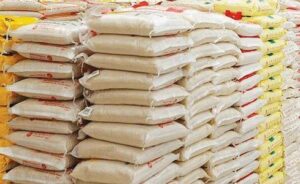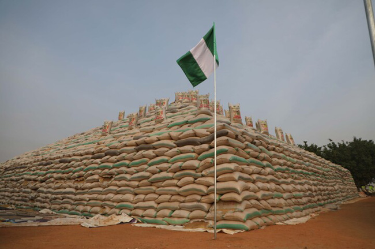In an effort to alleviate the rising cost of food in Nigeria, the Federal Government has rolled out a significant intervention aimed at making rice more affordable for citizens. This program, which involves the sale of 30,000 metric tonnes of milled rice, is intended to help ease the food crisis that has gripped the nation. However, this initiative comes with strict conditions to ensure that the rice is distributed fairly and reaches those in need, particularly public servants.
During the flag-off ceremony, the Minister of Agriculture and Food Security, Abubakar Kyari, emphasized that only public servants with duly registered National Identification Numbers (NIN) will be eligible to purchase the rice. The Minister, who was represented by President Bola Tinubu, noted that the stringent conditions are necessary to curb any attempts at racketeering, which could see the rice fall into the hands of unscrupulous individuals aiming to resell it for profit. He stated that the rice would be sold on a strict “one man to one bag or one woman to one bag” basis. This intervention is part of a broader plan by the government to address food security and bring down the skyrocketing prices of essential commodities.
 Kyari elaborated on the rationale behind the program, explaining that the 50kg bags of rice would be sold at a subsidized price of ₦40,000. This price is significantly lower than current market rates, offering some relief to the average Nigerian household. The Minister underscored the importance of this intervention, particularly in the context of the multiple challenges currently facing the nation, including the lingering impacts of the COVID-19 pandemic, the Russia-Ukraine war, and climate change. He noted that these global and local factors have all contributed to rising food prices and increased concerns about food insecurity in Nigeria.
Kyari elaborated on the rationale behind the program, explaining that the 50kg bags of rice would be sold at a subsidized price of ₦40,000. This price is significantly lower than current market rates, offering some relief to the average Nigerian household. The Minister underscored the importance of this intervention, particularly in the context of the multiple challenges currently facing the nation, including the lingering impacts of the COVID-19 pandemic, the Russia-Ukraine war, and climate change. He noted that these global and local factors have all contributed to rising food prices and increased concerns about food insecurity in Nigeria.
“This food intervention is timely considering the difficult times and challenges we are experiencing as citizens of this great nation,” Kyari remarked. He went on to commend the administration for its efforts in addressing the issue of food insecurity. Alongside the sale of rice, the government had earlier released 42,000 metric tonnes of assorted food commodities to vulnerable groups across the country, further demonstrating its commitment to alleviating the hardships faced by citizens.
Kyari, in his address, stressed that these challenges are not unique to Nigeria, as the global community grapples with similar issues related to food insecurity and economic instability. However, he expressed confidence in the government’s ability to mitigate the impact of these challenges on the Nigerian populace, particularly through interventions like the rice sale. The minister called for patience and support from Nigerians as the government continues to roll out more measures aimed at stabilizing the economy and enhancing food security.
The sale of the rice, however, comes with a set of conditions designed to ensure transparency and prevent exploitation. One of the primary measures is the use of the National Identification Number (NIN) to verify buyers. Only individuals with a registered NIN will be allowed to purchase the rice, and they will be limited to one bag per person. This requirement is part of a broader effort to ensure that the rice reaches those who truly need it, rather than falling into the hands of middlemen or fraudsters.
In addition to the NIN requirement, public servants registered under the Integrated Payroll and Personnel Information System (IPPIS) platform will also be eligible to buy the rice. This system, which tracks government employees, will help to ensure that the rice is distributed fairly among public servants. Kyari mentioned that other identification methods, such as phone numbers, could also be used to verify buyers and prevent any attempt to purchase multiple bags.
To further enhance the transparency of the process, a multi-disciplinary government team has been deployed to oversee the sale. This team is tasked with ensuring that the rice is sold fairly and that the program reaches as many citizens as possible. Kyari noted that this intervention is expected to have a positive ripple effect on the prices of other food commodities, particularly substitutes and alternatives to rice.
In outlining the procedures for purchasing the rice, Haruna Sule Abutu, the Director of Food and Strategic Reserve in the Ministry of Agriculture and Food Security, provided more details on the verification process. Abutu explained that at the point of sale, buyers with a NIN would be required to log into the system, where a unique code number and Treasury receipt would be generated. This receipt, which would include the time and location of collection, would then be presented at the collection center to pick up the bag of rice. This system, according to Abutu, is designed to ensure orderliness and prevent any form of stampede at the distribution points.
The government’s rice intervention is seen as part of a wider strategy to address food security and reduce the burden on Nigerian households, who are grappling with the effects of inflation and rising food prices. The government remains optimistic that the injection of 30,000 metric tonnes of rice into the market will help stabilize prices, not just for rice but for other staples as well.
The Minister closed his remarks by urging Nigerians to remain patient and supportive of the government’s efforts. He acknowledged that while the challenges facing the country are significant, the government is fully committed to finding lasting solutions. With more interventions planned in the coming months, there is hope that these efforts will begin to yield positive results and help improve the living conditions of Nigerians across the country.
In sum, this initiative, along with other ongoing interventions, represents a concerted effort by the government to address the high cost of food and ensure that every Nigerian has access to affordable, nutritious food. The success of this program, however, will largely depend on the cooperation of all stakeholders and the ability of the government to maintain transparency throughout the process.




